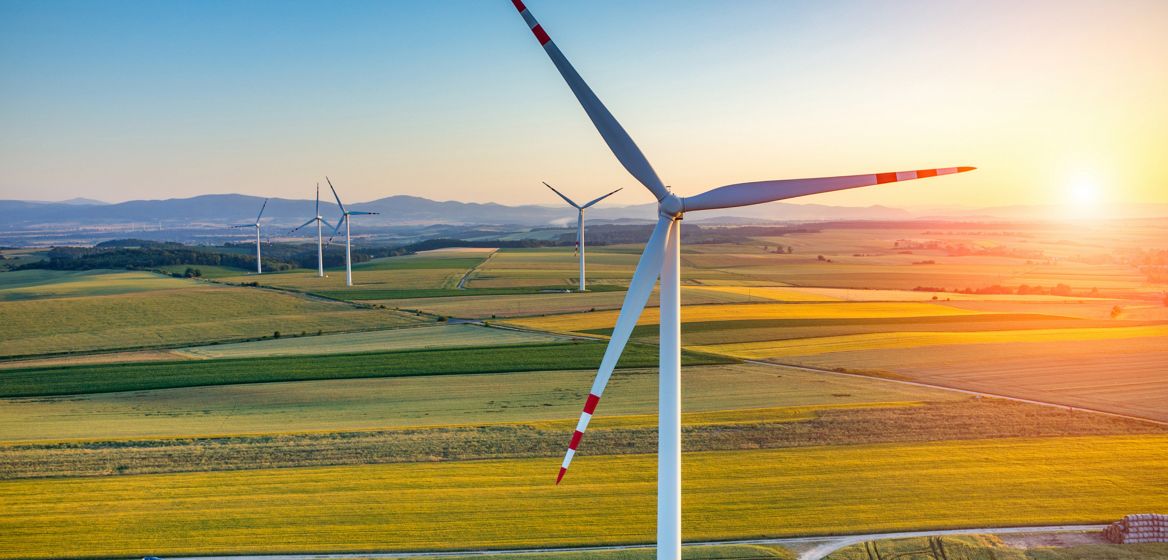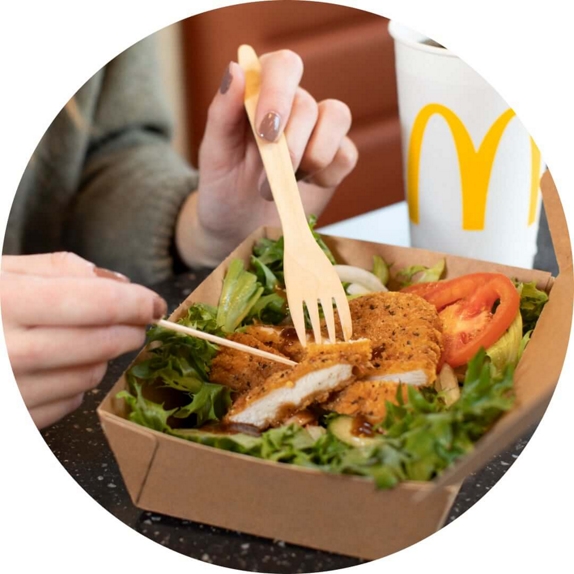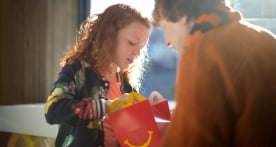Our Planet
Our success is closely interlinked with the health of shared natural resources, which form the foundation of the agricultural supply chains for our menu.
Our Impact Areas
In partnership with our Franchisees, suppliers and producers, we’re finding innovative ways to reduce emissions, keep waste out of nature and preserve natural resources.
We believe that reducing emissions and adapting to climate change is critical to helping improve the resilience of the McDonald’s System. We work toward our climate action ambitions by focusing on reducing emissions in restaurant operations, engaging suppliers to reduce emissions in supply chains, strengthening our business resilience and using our voice to advocate for collective transformation.
Our packaging, toys and waste strategies are designed to help keep communities clean, help protect the planet for future generations and support the Company’s long-term business resilience. To achieve this, we’re evolving our packaging – redesigning some of our most iconic products to eliminate unnecessary packaging, identifying alternative materials and increasing opportunities for recovery.
We aim to help manage nature-related risks and build resilience by working with suppliers and farmers to help preserve natural ecosystems, including forests, enhance biodiversity and safeguard water.
Discover how our commitments are guiding our responsible sourcing, as well as how we are building resilience into our business in a changing world. We are also committed to respecting the human rights of the people who work across the System.
Recent Highlights
Climate Action
- Scope 1 – 12% reduction compared to 2018 baseline.
- Scope 2 – 68% reduction compared to 2018 baseline.
- Scope 3 – 3% reduction compared to 2018 baseline.
- Completed an evaluation of the potential impact of updating to energy-saving equipment in existing restaurants and embedding such equipment into new-build processes.
Packaging, Toys & Waste
- As of the end of 2024, we were approximately 90.93% of the way toward our goal of sourcing 100% of our primary guest packaging1, 2 from renewable, recycled or certified materials.
- From 2018–2024, we reduced virgin fossil fuel-based plastic in Happy Meal® toys by 80.26%.3
- In 2024, approximately 89.6% of restaurants in markets with advanced infrastructure4 offered guests the opportunity to recycle and/or compost packaging items.
Nature, Forests & Water
- The Company continues to drive resilience-focused transformation of production systems in its supply chain through its work toward eliminating deforestation and addressing conversion for beef, soy (for chicken feed), palm oil, coffee and fiber (used in primary guest packaging) in priority regions.
- We have moved from soy Book and Claim credit purchases to scaling funding for landscape-level solutions and initiatives.
- We have continued to help upskill suppliers on resiliency efforts, our commitments and our policies, to strengthen their technical capacity on nature and water resource protection.
- The Company conducted a water risk assessment of its value chain across select suppliers and franchised restaurants, in addition to Company-owned and operated restaurants, to identify water-stressed5 areas.
- We launched a comprehensive survey of globally managed suppliers in the categories of beef, chicken, potatoes, buns/bread and beverages to help us better understand how they are currently managing their water-related risks and impacts.
Related News
- Composting & Community: How Arcos Dorados is Embracing More Sustainable Practices in Brazil
- Doing Décor Differently: McDonald’s France Debuts Circular Restaurant Design
- Dressed to Impress: McDonald’s Debuts New, More Sustainable Uniforms in the U.S.
Reporting Across Our Purpose & Impact
For a comprehensive view of our progress and actions in 2024, please see our Goal Performance & Reporting page.
This section of our website – Our Purpose & Impact – acts as the primary platform for our foundational approach, strategies and policies over each of our priority environmental and social issues, alongside recent progress highlights. In addition to our overall approach to issues, our goals and performance work in tandem to advance transformation across our four Impact Areas, helping us drive meaningful impact.
Related Impact Areas
Additional Impact Areas across our four pillars include:
Footnotes
1 Primary guest packaging: Single-use fiber and plastic packaging used to package guest food and drinks on premises at McDonald’s restaurants that is given to customers in all order channels, including cups, lids, bags, cartons and clamshells, napkins, wraps, cup carriers, cup sleeves, salad and dessert and breakfast packaging, bowls and containers, straws, cutlery, stirrers and associated wrappers. This includes also Happy Meal® toy and book packaging, all coatings on fiber-based packaging and items made of 100% non-wood alternative natural fibers.
2 Packaging. Scope: Inclusive of all markets for our fiber-based packaging, plastic-based packaging and Happy Meal book and toy packaging. Renewable sources refers to material that is composed of biomass from a living source and that can be continually replenished. Renewable applies to plastics only, not fiber. Source: ISO 14021:2016 for plastic, ASTM 6866 or ISO 16620-2. Fiber-based packaging made from 100% recycled sources must be third-party verified, unless certified under a Chain of Custody Forest Management standard. McDonald’s requires all wood fiber finished product originating from Argentina, Cambodia, China, Indonesia, Laos, Malaysia and Vietnam to be Forest Stewardship Council (FSC®)-certified or FSC®)-controlled wood sources with full chain of custody certification. Please refer to our Nature, Forests & Water web page for additional definitions. Exclusions: Primary fiber-based packaging in food packaged off-site of McDonald’s restaurants, tray liners test items, and limited locally sourced items. Non-structural components of packaging vary based on the packaging but may include adhesives, inks, overprint varnishes, retention agents or binders, processing aids, impact modifiers, minerals used non-structurally as well as structurally, and nucleating and clarifying agents. We continue to monitor industry standards on these components and look for opportunities to work toward making any part of our packaging, including non-structural components, more sustainable.
3 Toys. Scope: Inclusive of all toys. Fiber-based toys or fiber components in the toys: 100% certified fiber required. All other materials: McDonald’s ambition is to reduce the use of virgin fossil fuel-based plastics, offer more sustainable toys by the end of 2025 and not manufacture electronics and batteries in Happy Meal toys globally. For plastics to be considered sustainable for McDonald’s, a minimum of 60% of plastic weight is required to come from recycled or renewable content or a combination of recycled and renewable content, though in many practical applications we anticipate that percentage will be much higher. The remaining 40% may be conventional fossil fuel-based material. These thresholds were developed in conjunction with input from nongovernmental organizations (NGOs), external manufacturing partners and scientists, and based on an assessment of sustainable toy and packaging industry leaders so that our targets reflected current sustainable engineering capabilities to maintain safety and functionality. Our efforts will result in an approximate 90% reduction in virgin fossil fuel-based plastic use against a 2018 baseline. Fiber-based packaging made from 100% recycled sources must be third-party verified, unless certified under a Chain of Custody Forest Management standard. Source: ISO 14021:2016. McDonald’s requires all wood fiber finished product originating from Argentina, Cambodia, China, Indonesia, Laos, Malaysia and Vietnam to be FSC®-certified or FSC®-controlled wood sources with full chain of custody certification. Exclusions: The thresholds described above do not include the presence of adhesives, glues, inks, overprint varnishes, pigments, heat transfer labels, retention agents or binders, processing aids, nucleating agents and clarifying agents, impact modifiers, two-color plush cord, thread, sewn-in tags, lining tape, high-pile, inaccessible metal components, pencil cores and gearboxes.
4 Markets with advanced infrastructure: Mature waste and recycling infrastructure at a national level that has (1) recycling infrastructure network across the entire market, (2) multiple materials being recycled within this national infrastructure network, (3) existing legislation on recycling and (4) high customer awareness of waste and recycling. At the end of 2023, that included 21 markets where McDonald’s operates.
5 In this context, baseline water stress (BWS) measures the ratio of total water demand to available renewable surface and groundwater supplies.







